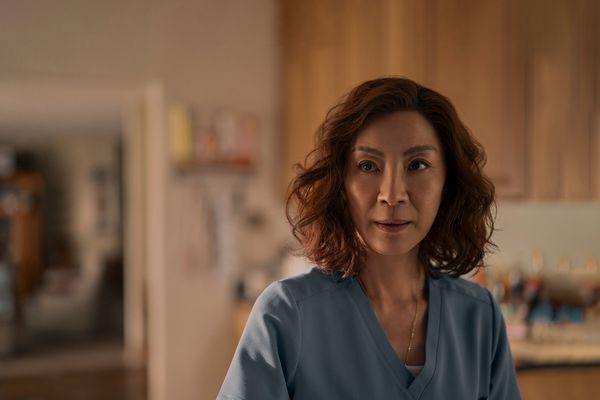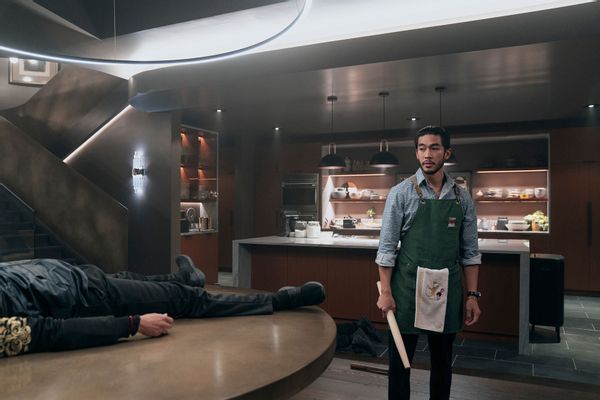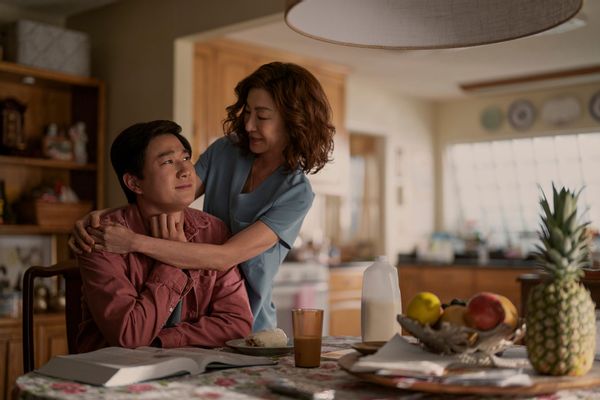
"I've never done anything quite like it."
Sam Song Li is describing a scene from Netflix's dark action-comedy "The Brothers Sun," in which he and his onscreen brother played by Justin Chien are going mano a mano with . . . dinosaurs. To be more accurate, they're fighting mobsters dressed in inflatable dinosaur costumes at a child's Jurassic-themed birthday party.
"The Brothers Sun" examines what happens when long-estranged siblings – one working for the Triad in Taiwan, one studying pre-med in California – reunite and reckon with the dangerous legacy that a secret their parents kept from them has wrought. As with any self-respecting mob project, "Brothers Sun" packs fight scenes into each of the eight episodes, ratcheting up the action as loyalties are tested and bodies start to pile up. What sets this series apart, however, is how it challenges that violent mindset and hyper-masculinity by reframing the narratives through unexpected left turns and humor.
Salon spoke to several cast and crew members to unpack what makes "Brothers Sun" unique. Byron Wu, who co-created the series with Brad Falchuk ("Pose"), grew up watching organized crime movies, from Hong Kong's "Infernal Affairs" to Martin Scorsese's oeuvre. But it was after seeing an interview with Japanese director Juzo Itami ("Tampopo," "A Taxing Woman") that inspired Wu to write a series that would upend the Triad stories that we know.
"Itami was a very tongue-in-cheek filmmaker and he did a movie about the yakuza," Wu said. "After the movie came out, he went back home to his apartment, and there are these gangsters waiting for him. They beat him up, cut his face and told him, 'Don't you dare make another movie making fun of yakuza ever again.'
"I thought that was so funny that these guys were so insecure about their jobs that they felt the need to beat up a comedy director. And so that is where that comes from, in terms of how we're looking at these gangsters. So much of it is about Asian American masculinity and insecurity, and that just permeates how we want to present gangs."
Into this framework comes Charles Sun (Chien), a deadly enforcer and heir apparent to Triad gang the Jade Dragons in Taipei. An expected event leads him to suspect a rival gang is going to target his mother Eileen "Mama" Sun (Michelle Yeoh) who's been hiding out in the States and raising his younger brother Bruce (Li) on her own. When Charles heads to California to protect them, he discovers that Bruce has no idea about his family's murderous, criminal side and what dangers that will bring into his life. Meanwhile, Bruce's mind is on his true passion, to be the next improv star for the Groundlings, even though Mama Sun has raised him to someday become a doctor and save lives – not take them.
The mother of all gangsters

Wu explained how Mama Sun was inspired by his own mother.
"I remember growing up and being embarrassed by my mom," he said. "I remember going with her to work where she was a development manager at Microsoft, and people were scared of her there. And that was a realization. I was like, 'Oh my God, my mom's actually a bada**.'
"Learning about her story – where she came from, how much struggle she had in China, her dream to go to college, coming to the United States with so little English as well as connection and forging her own way here – that understanding of how powerful she really is was such a huge part of Mama Sun as a character."
This emphasis on motherhood adds nuance to the usual Triad tales where the action is often predicated on revenge or damaged pride. In "The Brothers Sun," the idea of saving something precious is the impetus for the action, with Mama Sun's sacrifice doubled. Not only did she abandon her husband and one son, but she also had to start with a blank slate in a new country, shielding Bruce from the reality of his father and brother's criminal enterprise in Taiwan. Therefore, when Charles shows up on her doorstep with killers trailing behind, it's not exactly a warm reunion.
"She struggles with the son she had to leave behind and the reasons why she did it," explained Wu. "She had to save one of her sons and she sees Charles is capable of something dark that happens at a young age, so dark that she wonders if there is redemption for him in his future. There's that tragic underpinning in the relationship."
The son also rises

Chien was well-prepared to play the son who could take charge and take action. His 10 years of Muay Thai and four years of Brazilian jiujitsu meant he had the physical ability to pull off the numerous fight scenes, while also working with fight coordinator Eric Brown ("John Wick") and stunt coordinators Justin Yu and Michael Lehr to hone a style more fitting of a Taiwanese mobster.
"I remember learning Wing Chun, taekwondo, karate," said Chien. "I definitely had to brush up and improve my kicks. There's a big difference in Muay Thai kicking versus taekwondo and karate kicking. I learned some elements of kali, which is Filipino stick fighting that influenced a lot of the knife work. And then I also had the chance to shoot at Taryn Butler's range to help inform some of the scenes of firearms."
All of this training prepared Chien to wield unconventional weapons as well, ranging from a pineapple to a wok. After all, this is a show where gangsters attack a sauna or masquerade as dinosaurs; Charles needs to be ready no matter what. Chien points out, however, that all that training "also affects Charles' mental and emotional states."
Like "The Sopranos," having multiple episodes allows "The Brothers Sun" to delve more into the mind of a gangster, exposing both mental health issues and also a lighter human side. Can Charles ever escape his killer tendencies? He's been raised to put the survival of his family's criminal interests first. However, we soon learn that he has another passion: baking.
Charles is a devoted viewer of "The Great British Bake Off" and uses baking as an appropriate outlet for his emotions. (Downside: When his souffle deflates, so do his spirits.) Once he lands in California, he also discovers a new goal: to perfect his churro recipe. Baking is no mere hobby for Charles but an essential aspect of how he can maintain sanity as a Triad member.
"Charles had no choice but to be a killer," explained Wu. "We wanted him to have something that was just for himself, a selfish personal love and desire that he keeps at. It's an allegory to what a lot of Asian Americans go through with their parental pressure of wanting of them being whatever it is considered those good professions – engineering, doctor, lawyer – while they have their own secret things that they want to do, but they don't feel like they can."
Chien confirms that despite being the consummate gangster, Charles would prefer to spend his time far from violence.
"For Charles, his perfect day would be a quiet peaceful one where he doesn't have to do Triad activities, where he doesn't have to kill anybody," said the actor. "Where Charles would probably spend the day, lock his door make sure none of his colleagues or associates come in and watch 'The Great British Bake Off,' work out and probably bake a few things. Order takeout. And I don't know, maybe stalk [his old friend] on Instagram."
The "Yes, and . . ." man

"Bruce is Mama Sun's baby. She rescued him from that life and she wants him to stay out of that life," said Wu. "Bruce wants some respect, right? He believes it's through improv that he'll be achieving this respect. But then you learn through the series, there's a deeper respect to this family and how he has to earn that through stepping up in other ways.
"We talked about thematically duty to self versus duty to the the family with Charles representing duty to family and Bruce representing that duty to self. It's such an Asian American story of how much do you do for yourself and how much of you for your family? Bruce's arc is really going from doing things for himself – the improv goofing off, selling drugs and all that stuff – and then he learns how important it is to do things for family."
The answer, of course, lies in comedy. In this case, Bruce's Groundlings improv instruction is literally his secret weapon to dealing with the various Triad members who only know how to approach situations through violence or intimidation. In the series, Bruce has a pin on his bag that reads, "Yes And" referring to the improv mindset to accept a situational prompt and then expand on it. Li believes that ability to riff creatively on the spot serves Bruce well.
"In anticipation for this project, I definitely brushed up on my improv and specifically took Groundlings classes to really just figure out what the headspace is for Bruce and for the improv scenes. I feel like there's the beauty of the 'Yes, and. . .' It's a term that is used in improv to go with the flow, and it's a recurring theme. It's shaped the way that I think Bruce views life and every circumstance that appears before him or challenges him. That's why Bruce is able to adapt so quickly and think so quickly on his feet."
It's a lesson that Li took to heart as well when battling the dinosaur-suited stuntman. While the script originally intended Bruce to knock off his assailant's dinosaur mask, the show's pivoting to inflatable dinosaur costumes changed the action on that day of shooting.
"We made changes to one of the beats that Bruce does with one of the dinosaurs," said Li. "In the script I was supposed to hit the dinosaur and make their mask fall off, and the assassin behind the mask is just deadpan and goes right back trying to kill me.
"But because they were inflatable costumes, they go right back [into shape]. We just played off of that. It's funny how the inflatable dino head . . . shoots back up. There was a lot of little improv things that on the day that we actually got to do because of those inflatable dino suits."
Check back with Salon for more about "The Brothers Sun" (and that dino fight). "The Brothers Sun" streams all eight episodes beginning Thursday, Jan. 4 on Netflix.







